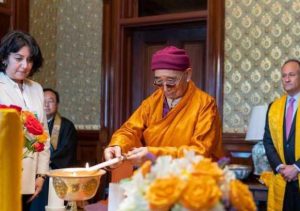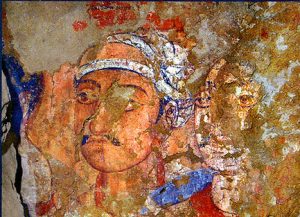
The following text has been arranged according to my own layout and paraphrased somewhat loosely from an otherwise excellent translation by Venerable Nyanaponika Mahathera, who was my mentor and teacher in Sri Lanka in the late 1980s. My intention is not to improve on the original transliteration, but rather to attempt to make this profound text look and sound somewhat easier on the eye and ear.
On one occasion the Blessed One was staying at Cáliká, up on Cáliká Hill. There Venerable Meghiya, who was the Blessed One’s attendant at that time, approached to pay him homage. Standing to one side, he spoke:
“Lord, I wish to go to Jantugáma for alms.”
“You may do as you think fit, Meghiya,” said the Buddha.
So Ven. Meghiya, after dressing himself in the morning, and taking his robe and bowl, entered Jantugáma for alms-gathering. Then, having made his alms round and having taken his meal, Ven. Meghiya went to the bank of the Kimikálá River, where, while walking to stretch his legs, came across a beautiful mango grove.
On seeing it, he thought:
“Pleasant, indeed, is this mango grove. It is beautiful. Truly, it is fit for a clansman who wishes to strive in meditation. If the Blessed One will allow it, I shall return to this mango grove to strive in meditation.”
Ven. Meghiya then approached the Blessed One, saying:
“Lord, after my alms round in Jantugáma, having taken my meal, I went to the bank of the Kimikálá River, and while walking there, I saw a pleasant, beautiful mango grove, which I thought to be fitting for a clansman who wishes to strive in meditation. So if the Blessed One will permit me, I’ll go there and strive.”
However, the Blessed One said:
“Wait a while, Meghiya. We are here alone now. First, let another monk come.”
But the Ven. Meghiya repeated his request:
“Lord, for the Blessed One there is nothing further to achieve and no need to consolidate what he has achieved, but as for me, Lord, there is still more to achieve and still the need to consolidate what I have achieved. So if the Blessed One permits me, I shall go to that mango grove and strive.”
Again the Blessed One asked him to wait, and again, for a third time, Ven. Meghiya made his request, until the Blessed One eventually said:
“As you speak of striving, Meghiya, what can we say? You may do now as you think fit.”
Ven. Meghiya then rose from his seat, saluted the Blessed One, and keeping him to his right, headed toward the mango grove. Having arrived, he went deep into the grove and sat beneath a tree where he intended to spend the day. However, while he was sitting in the mango grove, three sorts of evil, unwholesome thoughts assailed him constantly: sensual thoughts, thoughts of ill will, and thoughts of doing violence.
Then he thought:
“Truly, it is strange, it is amazing! I have gone forth from home into the homeless life out of faith, and yet I am still harassed by these three kinds of evil, unwholesome thoughts: sensual thoughts, thoughts of ill will, and thoughts of violence.”
Ven. Meghiya then returned to the Blessed One, and having saluted him, he related what had happened:
“It is truly strange, it is so amazing! I have gone forth from home into the homeless life out of faith, and yet I find myself harassed by these three kinds of evil and unwholesome thoughts.”
The Buddha replied:
“If, Meghiya, the mind is still lacking the needed maturity to achieve liberation, there are five conditions conducive to making the mind more mature.
“The first thing, Meghiya, needed for making an immature mind become mature enough to achieve liberation is to have a noble friend, a noble companion, a noble associate.
“Further, Meghiya, a monk should be virtuous, guided by the restraints of the Pátimokkha, perfect in conduct and resort, seeing danger in the slightest faults. Having undertaken the training rules, he should train himself in them. This is the second thing that makes the immature mind mature for liberation.
“Further, Meghiya, any talk in which a monk engages should be fit for the austere life and be helpful in gaining mental clarity. In other words, it should be talk on fewness of wishes, on contentment, on solitude, on seclusion, on application of energy, on virtue, concentration, wisdom, liberation, and on the knowledge and vision of liberation. If a monk finds opportunities for such easily, without difficulty, this is the third thing that may make the immature mind mature for liberation.
“Further, Meghiya, the monk lives focusing his energy upon the abandonment of everything unwholesome and upon the acquiring of everything wholesome; he is steadfast and strong in his effort, and does not shirk his task with regard to wholesome qualities. This is the fourth thing that makes the immature mind mature for liberation.
“Further, Meghiya, a monk possesses wisdom. He is equipped with wisdom capable of seeing through the rise and fall of phenomena, which is noble and penetrative, and which may lead to the complete destruction of suffering. This is the fifth thing that makes the immature mind mature for liberation.
“When, Meghiya, a monk has a noble friend, a noble companion and associate, it can be expected the he will be virtuous, that he will engage in talk which is befitting for the austere life and helpful in attaining mental clarity, so that his energy will be focused upon the abandoning of everything unwholesome and the acquiring of everything wholesome, and that he will thereby be equipped with the wisdom capable of leading to the complete destruction of suffering.
“Then, Meghiya, when the monk finally becomes firmly grounded in these five things, he should cultivate four more things: he should cultivate the meditation on the foulness of the body for the abandoning of lust; he should cultivate loving-kindness for abandoning of ill will; he should cultivate mindfulness of breathing for cutting off distracting thoughts; and he should cultivate the perception of impermanence for the elimination of the conceit, ‘I am’.
“In one who perceives impermanence, the perception of non-self becomes firmly established, and one who perceives non-self thereby achieves the elimination of the conceit, ‘I am,’ and thereby attains Nibbána in this very life.”
In this way, Ven. Meghiya benefitted greatly from the guidance of the Blessed One.
References
The Anguttara Nikaya, Chapter of the Nines 128 Meghiya: https://buddho.org/book/anguttara-nikaya-anthology/
Related features from BDG
Sensuality, Contact, and Attachment
Hindering the Hindrances
The Four Sublime States












